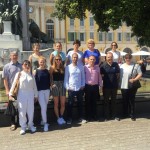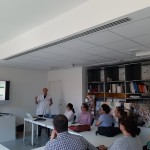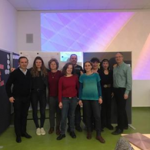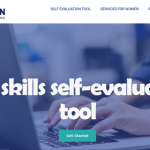
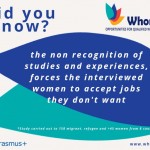 This platform, developed by the Italian partner COSPE Onlus, was developed specifically for women at risk of social exclusion (Migrants/Refugees or +45 years old women looking for job opportunities) and professionals working with them. There, they have the chance to map out an individual’s profile of soft skills acquired in their lives and work experiences. Users can be: Continue reading
This platform, developed by the Italian partner COSPE Onlus, was developed specifically for women at risk of social exclusion (Migrants/Refugees or +45 years old women looking for job opportunities) and professionals working with them. There, they have the chance to map out an individual’s profile of soft skills acquired in their lives and work experiences. Users can be: Continue reading
ACTIMENTIA – 2nd Project Meeting in Nice
Developing an online platform to support the day-to-day work of carers of people with cognitive disabilities and delaying development of the disease is the most important task that participating organizations in the ACTIMENTIA project must accomplish.
WhomeN research published
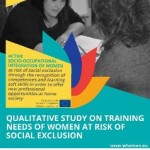 The purpose of the study was to allow a step of fine tuning of the Project strategy with a deeper diagnosis of women situation, training needs and difficulties. With the study it will be easier to define soft skills acquisition/recognition paths and to better propose the experimentation of this protocol.
The purpose of the study was to allow a step of fine tuning of the Project strategy with a deeper diagnosis of women situation, training needs and difficulties. With the study it will be easier to define soft skills acquisition/recognition paths and to better propose the experimentation of this protocol.
This study was conducted in seven countries, where women were divided in two main categories: (1) immigrant and refugee women from Germany, Italy (Veneto region), Romania and Spain (Andaluzia) and (2) women over 45 from Bulgaria, Latvia and Slovenia. Continue reading
WhomeN Curriculum for training trainers – evaluation and recognition of soft skills
 During the first week of April (1st to 5th of April) the second short-term training event and the third International Meeting to evaluate the implementation of the Protocol in women at risk of social exclusion, took place in Riga, Latvia.
During the first week of April (1st to 5th of April) the second short-term training event and the third International Meeting to evaluate the implementation of the Protocol in women at risk of social exclusion, took place in Riga, Latvia.
All partners gathered for a week of activities related to the integration of vulnerable women in the labour market through the improvement of their soft skills.
 The trainers had the opportunity to learn more about mentoring women, how to promote soft skills such as achievement orientation through art activities, namely collage and comics and how to support women in their time management. The training also focused on topics of individual support and methods for developing cooperation and communication within a group. Continue reading
The trainers had the opportunity to learn more about mentoring women, how to promote soft skills such as achievement orientation through art activities, namely collage and comics and how to support women in their time management. The training also focused on topics of individual support and methods for developing cooperation and communication within a group. Continue reading
Kick off Meeting Project ACTIMENTIA
ACTIMENTIA – New Erasmus+ project
ACTIMENTIA 2018-1-DE02-KA204-005231 is an ongoing European collaborative project that has been funded with the support of the Erasmus+ program (KA2) of the European Union. It lasts from 2018 to 2021.
Multiplier event Hand in hand – health for all – project WHOLE
Imperceptibly passed the 3-year WHOLE project, which was launched in September 2016. During the past time, the project consortium consisting of different organizations from 6 European countries, inc. two universities, managed to carry out a variety of activities to develop and implement the project proposal tasks and to reach project goals.
Transversal competences and soft skills for women with fewer opportunities – Curriculum for training trainers
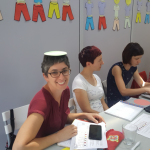 The curriculum serves the need to train adult education professionals for their work with women at risk of social exclusion and fewer educational opportunities. The training based on that curriculum should help the practitioners to support women with fewer opportunities to get aware of their transversal and social skills and to strengthen them with the aim to increase their chances of an adequate equal integration into the labor market. Continue reading
The curriculum serves the need to train adult education professionals for their work with women at risk of social exclusion and fewer educational opportunities. The training based on that curriculum should help the practitioners to support women with fewer opportunities to get aware of their transversal and social skills and to strengthen them with the aim to increase their chances of an adequate equal integration into the labor market. Continue reading
Last meeting project Senior Social Entrepreneuring – Srewsbury, UK
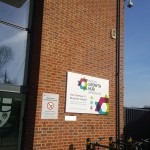 At the end of March 2018, the last meeting of project Senior Social Entrepreneuring was held. Host of the event was the UK partner organization – the University of Shrewsbury. During the meeting, the achievements reached by the consortium to date were discussed: developed portfolios with good local initiatives, good practices of social entrepreneurship from different European countries.
At the end of March 2018, the last meeting of project Senior Social Entrepreneuring was held. Host of the event was the UK partner organization – the University of Shrewsbury. During the meeting, the achievements reached by the consortium to date were discussed: developed portfolios with good local initiatives, good practices of social entrepreneurship from different European countries.
Whomen Assessment of Training Needs
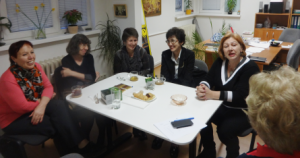 At Generations several meetings and discussions took place with different partners around a common topic: “Women at risk of social exclusion – what support and training do women aged 45+ need to best assure their adaptation to the new requirements of the labour market, that changed due to demographic and economic conditions?”
At Generations several meetings and discussions took place with different partners around a common topic: “Women at risk of social exclusion – what support and training do women aged 45+ need to best assure their adaptation to the new requirements of the labour market, that changed due to demographic and economic conditions?”

